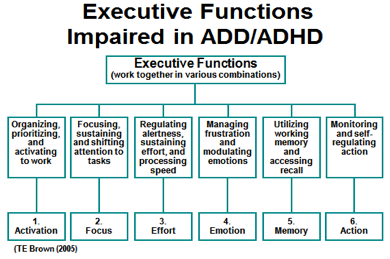4 Ways To Manage ADHD While Pregnant
How does anyone get through this?
 Getty
Getty Congratulations! You're having a baby!
And you have ADHD.
There are so many things to think about, plan, organize, and feel.
It's probably very overwhelming. But don’t worry! There are ways to manage it.
(All parties involved in producing this article wholeheartedly support the LGBTQ+ population. For the sake of simplicity, the gestational parent is referred to as "woman/women/mother.)
RELATED: 6 Common But Often Overlooked Symptoms Of ADHD In Adults
How to manage ADHD while pregnant in 4 key ways.
1. Talk about your emotions.
First of all, change the stereotype of women being "emotional" during pregnancy. Some are more sensitive to hormone shifts, pregnant or not. This is normal.
There's nothing "emotional" about it. A lot is happening in your body and brain because of hormone shifts.
And impending motherhood is anxiety-provoking. Not to mention, the beginning of a very big life transition.
If you have ADHD, you are more likely sensitive to hormone shifts. Dramatic drops in estrogen increase ADHD symptoms.
However, in the first trimester, there's a huge increase in estrogen that then levels out to a steady increase in the second and third trimesters, which can lessen your ADHD symptoms.
Some women even report almost no symptoms of ADHD while pregnant.
This also means that when estrogen levels dramatically drop right after delivery, you may notice your ADHD symptoms starting to return shortly thereafter.
And sensitivity to hormone shifts is also a risk factor for perinatal mood and anxiety disorders (PMADS).
If you notice significant mood shifts at certain times of the month or have ever been diagnosed with premenstrual dysphoric disorder, then it's important to keep this in mind when learning about your risk factors for PMADS.
But the good news is, PMADS can be prevented or at least minimized through education, awareness of your family history of mental health, your personal history of mental health, social support, therapy, and sometimes medication.
So in order to "manage" your emotions, simply lean into them with a lens of self-kindness.
Talk about them with those who get you, not those who judge and criticize you for having them. Just because someone doesn't understand your emotions, doesn't mean they aren't valid.
2. Know how your brain works.
Living with ADHD doesn't mean you need to be a neuroscientist. But, knowing how your ADHD impacts you is the most important tool at your disposal.
Everyone is different, even if they have the same diagnosis. These differences are due to life experience, when a diagnosis occurred, what treatment and support were received, and the fact that ADHD is complex.
ADHD is all about executive function.

The executive function mechanism of the brain is how you navigate every aspect of your day.
And when they don't function consistently, it's easy to get overwhelmed, frustrated, discouraged, and may even feel like you are failing on a daily basis.
On top of the executive function challenges, you may have negative internalized belief systems about yourself.
These are usually due to repeated demoralization from others who didn't understand or were not willing to understand that your behaviors were due to a neurobiological condition.
It's hard enough to navigate your day when you are only navigating for yourself.
Having a baby can mean you no longer control how you navigate your day or night. The baby does. But this is temporary. And knowing that it's hard can actually make it easier.
So just trust yourself and know you will figure it out.
3. Social expectations can impact how you feel about becoming a mother.
All of the social niceties of writing "thank you" notes, planning and hosting parties/playdates, meal planning, cooking, making appointments, time management, etc. are all the things that are the hardest for those with ADHD because they require no thought.
And it's boring. This also relates to a myth of motherhood — you must be a perfect mother.
There's no such thing as a perfect mother, only a good enough one.
Accepting your humanness will also help prevent or minimize your risk for PMADS.
4. Research your medication for ADHD.
Don’t assume that you need to get off of your medication before you become pregnant. I'm not just talking about antidepressants, I'm also talking about stimulants.
I know you want to protect your baby. But the research finds that with certain medications, including stimulants, that the risk is so low, if at all, that you can continue to stay on them.
In fact, getting off medications that benefit your mental health, puts your baby more at risk.
Feeling moderate to severely depressed and or anxious (including anxiety and depression that is related to your ADHD) while pregnant can allow your cortisol to penetrate through the placenta, changing the epigenetics of your baby.
So it's important to discuss this with a medical provider who has in-depth knowledge of perinatal psychiatry and adult ADHD.
Having a baby is a very exciting time in your life. It is also scary, overwhelming, and anxiety-provoking. And don't let social media or friends who say that pregnancy and motherhood are (only) amazing fool you.
You already know how difficult it is to live with ADHD, and having ADHD is a risk factor for PMADS. But, as I mentioned earlier, PMADS can be prevented, or at least minimized.
Motherhood was never meant to be easy.
But all you have to do is be a good enough mother. That's all any woman — neurodivergent or neurotypical — can be.
Jacqueline V. Cohen is a Licensed Professional Counselor, an ADHD Certified Clinical Specialist Provider, and a Certified Clinical Hypnotherapist who works with courageous women and mothers that want to live authentically. You can connect with her by e-mail or to learn more about her practice and specialties, visit her website.

